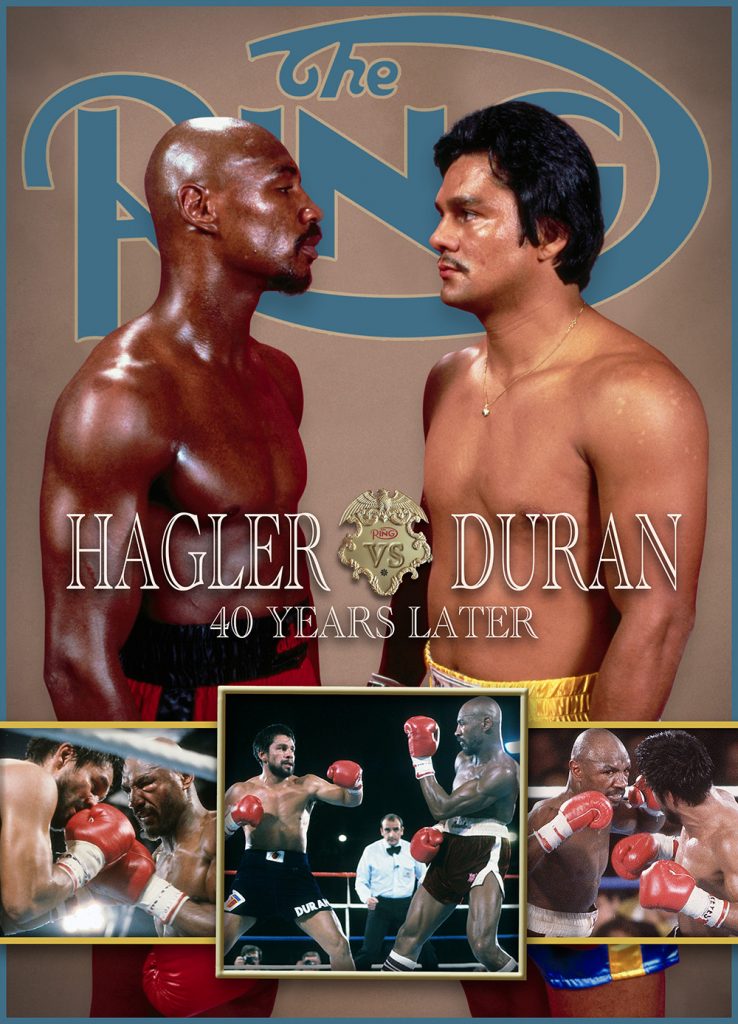Best I Faced: Oleg Maskaev
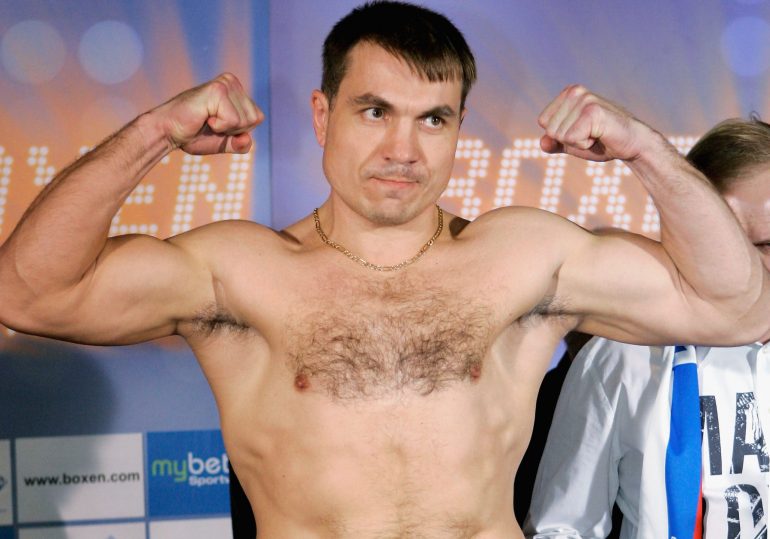
Big-punching amateur standout Oleg Maskaev was thrown to the wolves early in his professional career but still managed to climb the heavyweight rankings and eventually win the WBC title during the mid-2000s.
Maskaev, who was the middle child of three, was born in Abay, Kazakhstan on March 2, 1969.
“My parents belonged to the government, they had to work every day,” Maskaev told The Ring. “My father was a coal miner and my mother worked at the factory.
“I grew up in a tough neighborhood, on the street, you had to protect yourself. There’s a lot of tough guys – bad guys. My father told me, ‘Hey, you should start training in boxing to learn how to fight and protect yourself.'”
He listened to his father’s words and turned to boxing when he was 15, practicing in nearby Karaganda, whilst also working in the mines with his father.
When he was 18, he was offered the opportunity to move and train in Uzbekistan.
“Back then in the USSR, you were supposed to spend two years in the military, that’s the reason I went to Uzbekistan,” he explained. “My trainer from Kazakhstan had a good connection with people from Uzbekistan. They said ‘He’s a good fighter, he’s a young prospect, he should fight for the army not just spend two years doing something else.’ There was a special sportsman division, it was called SKA, sports club of the Red Army, where I was a lieutenant for 7 years.”
During his amateur career he notably beat future two-time heavyweight champion Vitali Klitschko in July 1991.
“I didn’t knock him out, but I stopped him, he went to the canvas two times. I hurt him really bad,” recalled Maskaev. “His trainer threw the towel in the ring.
“Later on, when he became a champion, he started saying ‘Oleg didn’t knock me out, I just pulled out of the fight because in the previous fight I hurt my right hand and couldn’t continue.’ But that was a lie. The referee didn’t open a count. I don’t know why but his trainer threw the towel in, so it was stopped.”
Maskaev’s aspirations of going to the 1992 Olympics were curtailed when he contracted hepatitis, and unbeknown to him, he would have his first taste of the pro ranks in April 1993.
“I fought against Alexei Miroshnichenko (21-0, 15 knockouts), a tough guy. He was already a professional boxer, I didn’t know that,” said Maskaev. “There was no opponent to fight me in Uzbekistan when I was training there. They said, ‘There is a fight against this guy, it’s a commercial fight, you’re going to make some money.’ That’s how they set me up.”
However, Maskaev shocked the favored Miroshnichenko in three rounds. He returned to the amateur side of the sport and lost to touted Cuban Roberto Balado at the World Championships in May 1993. He claimed silver at the World Cup in 1994 and gold at the Asian games.
“When I tried to go to the (1996) Olympics they said, ‘You have fought a professional fighter.’ I said, ‘When?’ they said, ‘Against Alexei Miroshnichenko, that was a professional fight. You can’t go, they will disqualify you.’ That’s why I couldn’t go to the 1996 Olympics,” he said.
Which lead to Maskaev, who went 108-10 as an amateur, officially turning professional in Boston in March 1995.
“Alexei Miroshnichenko was my ticket to the United States,” he said. “They were supposed to make a match with Miroshnichenko and Riddick Bowe because they fought in the Olympics and it was a close fight. They wanted to make a professional fight. Then they heard the news he had lost to some new, young fighter and that was me. They called me up and said, ‘Oleg you are guilty. Alexei was supposed to come to the United States and now you have a chance, come over, we’re going to check you out.'”
His team moved him quickly and in just his seventh fight he was matched with former WBC heavyweight titleholder Oliver McCall, who was on the comeback trail having lost his title to Frank Bruno in his previous fight.
“I was still green, I just turned pro, I didn’t have big experience to fight a former heavyweight champion like McCall,” he said candidly. “I was like a child against him mentally and spiritually. I was strong and in good shape but mentally I wasn’t there.
“He hurt me one time and I went down. I was not supposed to fight McCall. That was a set-up. I moved to the United States and hooked up with the wrong people and they just want quick money. They built my record and then said, ‘Let’s go and make money on this guy.'”
Four wins and just over a year later he was matched with the unbeaten power-puncher David Tua.
“I was able to outbox him using my left jab and right hands,” said Maskaev, who was ahead on one scorecard and even on another after 10-rounds. “I was winning the fight. I didn’t have much experience.
“I probably lost focus in the fight and wasn’t ready when he pushed me to the ropes and should have paid more attention to the defense and watch his previous opponents. I didn’t watch his prior fights, which I should have.
“In the late rounds, that is when he is most dangerous. He knocked me down, but the referee said I didn’t touch the floor with my knee, so it was a standing knockout. [The referee] is supposed to open a count and then I think I would be recovered. He didn’t knock me out, he just hurt me [and the fight was stopped in Round 11.]”
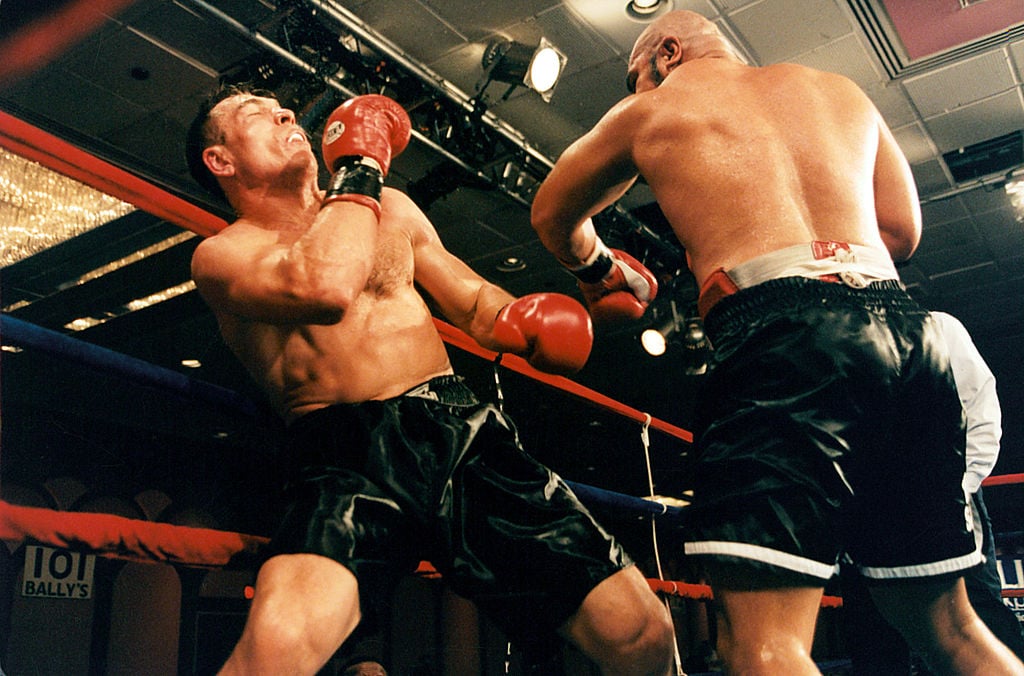
David Tua lands a left hook against Maskaev during their competitive fight at the Ballys Park Place Hotel Casino on April 5,1997 in Atlantic City. Photo / The Ring Magazine via Getty Images
Maskaev got back to winning ways, reeling off 10 consecutive wins, beating amongst others perennial contender Alex Stewart (TKO 7), once touted South African Courage Tshabalala (KO 9), future champion Hasim Rahman (KO 8) and heavy-handed Derrick Jefferson (TKO 4).
“I fought [Jefferson] after I fought Hasim Rahman and everybody was saying this guy was going to knock me out in a few rounds,” he recalled. “When I knocked out Rahman, they said it was a lucky punch and I didn’t have a chance against Jefferson.
“[Jefferson] was very strong and very quick, especially with the left hook and right hand. He nailed me a couple times, but my trainer and I was prepared for that, and I was able to block it and take the sting out of it. I was looking for it. They thought I’d be sluggish and slow, he tried to use his speed, work with me from distance but I was able to hurt him and knock him down twice in mid-range with the right hand. I think he hurt his ankle. After that he wasn’t really good to continue to fight.”
However, the powerful Russian was knocked out by Kirk Johnson (KO 4) and Lance Whitaker (KO 2) derailing him for a period of time.
“I hurt [Johnson] first in the first round, 15 more seconds and I would have finished him but unfortunately that was the end of the first round,” he explained. “My trainer said the wrong thing to me, ‘Oleg he is ready to go, just finish him.’ I lost my focus. I jumped on him and he put his head down and hit me with the right hand on my chin and hurt me. I was supposed to take a knee and the referee would count but I wanted to show he didn’t hurt me, but he had hurt me, and he hit me again and knocked me out. It was a big mistake.”
After two wins, he was ahead on the scorecards before he was stopped by American journeyman Corey Sanders (TKO 8). At this point Maskaev was 33, he’d lost 3 of his last 5 and appeared to be on the way down.
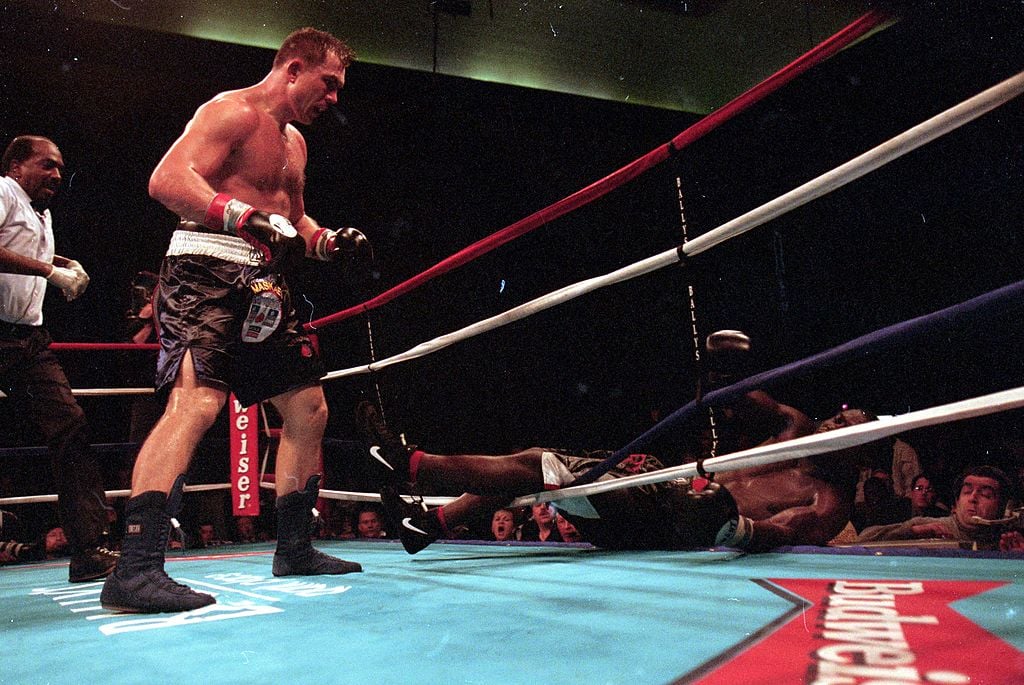
Despite scoring a highlight-reel KO against future champ Hasim Rahman in 1996, knockout losses to Kirk Johnson and Lance Whitaker put his career in jeopardy. Photo by Jamie Squire /Allsport
“I almost quit boxing because I had three tough loses by knockout,” he revealed. “I remember Bob Jackson, my second trainer, he said Oleg, ‘I want to talk to you.’ and we went to the coffee shop, and we sat down, he said, ‘Oleg, unfortunately you have three tough stoppages. I can’t train you anymore because I’m afraid for your health.’
“I didn’t give up after that. That’s how I found a new team. I still trained at Gleason’s gym, people were watching me and one guy, Victor Valle Jr., looked at me and started training me for a few days. He knew Dennis Rappaport and he said, ‘Dennis, this guy is strong and can still fight but was mismanaged. Check him out, he’s still good. If you want to sign him up that would be great. And I did a couple of months later. He knew how to pick up a good fight for me.”
His new team brought him back slowly, after six wins, all by knockout, he stepped up and took David Defiagbon’s unbeaten record by 10-round split decision. He scored an impressive road win in Germany over teak-tough Sinan Samil Sam (UD 12) in a WBC eliminator.
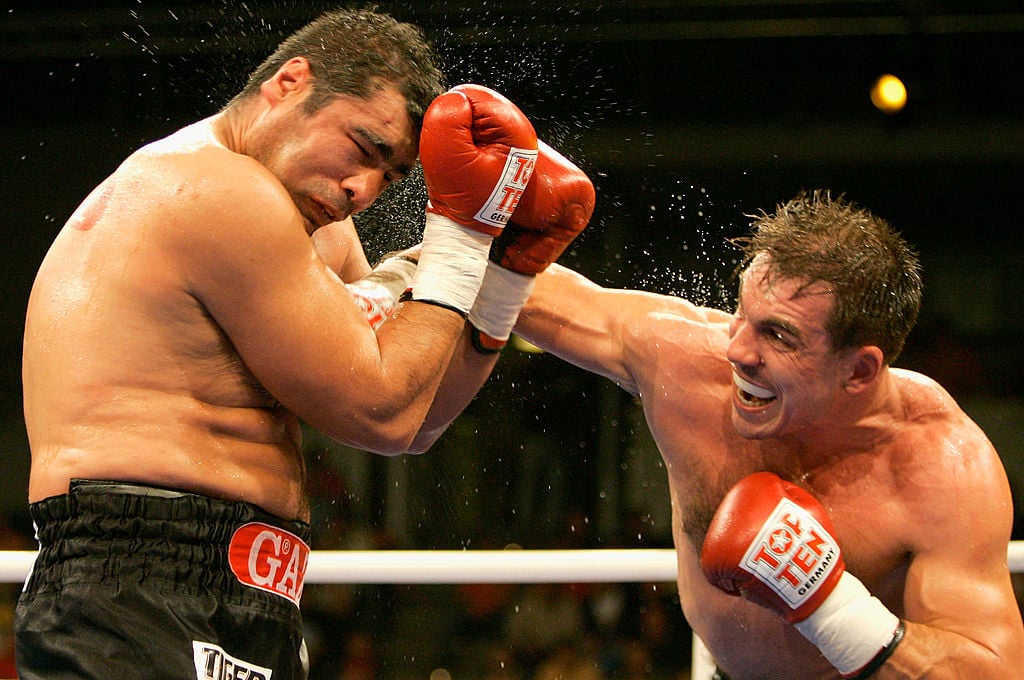
Maskaev (L) nails Sinan Samil Sam with big right during their title-elimination bout at the Hamburg Sports Hall on November 12, 2005, in Hamburg, Germany. Photo by Friedemann Vogel/Bongarts/Getty Images
That positioned him to face WBC heavyweight titleholder Hasim Rahman.
“I was injured before the fight, my lower back, one week before the one of the discs was dislocated,” he said. “I was ready to postpone the fight, but I knew if I did that, I wouldn’t have another opportunity to fight this guy because of Don King. We had to fight in court (just to get the fight). We’d been in court a couple of times; King was pushing us away from the championship. After Rahman fought James Toney, he was supposed to fight me because I beat Samil Sam.”
Despite the injury, Maskaev took full advantage of his big chance at the Thomas & Mack Center, Las Vegas in August 2006.
“I knew after the eighth round my stamina was a lot better than him,” he said. “I saw him, he was tired, and I knew the last rounds were my rounds and I picked it up and started hitting him with the left hook and right hand. That’s exactly how I hurt him, with the left hook and finished him with the right hand. He wasn’t ready for that.”
Maskaev scored the stoppage victory at 2:17 of the 12th and final round.
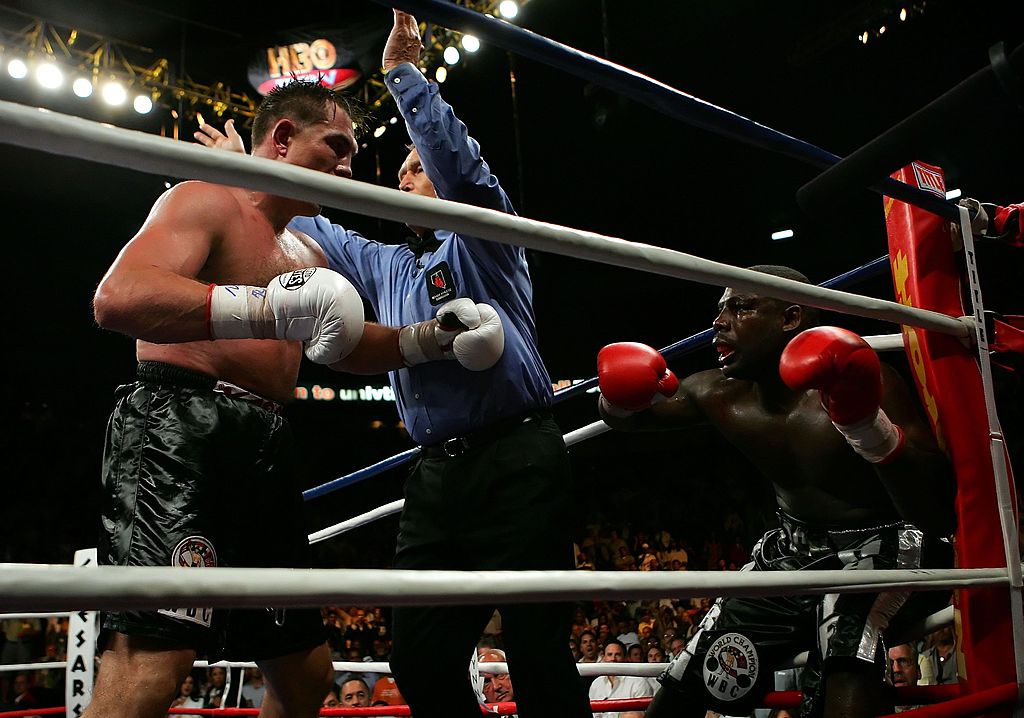
Hasim Rahman falls into the corner as referee Jay Nady calls the fight off and declares Oleg Maskaev the winner by TKO during the 12th round of their WBC title bout on August 12, 2006, at the Thomas & Mack Center in Las Vegas. Photo by Ethan Miller/Getty Images
“It changed everything, I went to Russia, and everybody was happy to see me there,” he recalled. “My fans, friends, family and me.
“My second team, Dennis Rappaport and Victor Valle looked at me very close and believed that I can be a champion if they lead me the right way, I am really blessed with that team.”
Maskaev returned to Russia to face largely unknown Okhello Peter in his first defense. Maskaev dominated the Ugandan to win a 12-round unanimous decision.
Then came his mandatory defense against Samuel Peter in Cancun, Mexico in March 2008
Peter hurt the defending champion in the third round and rocked him again in the fifth before stopping him in the sixth round.
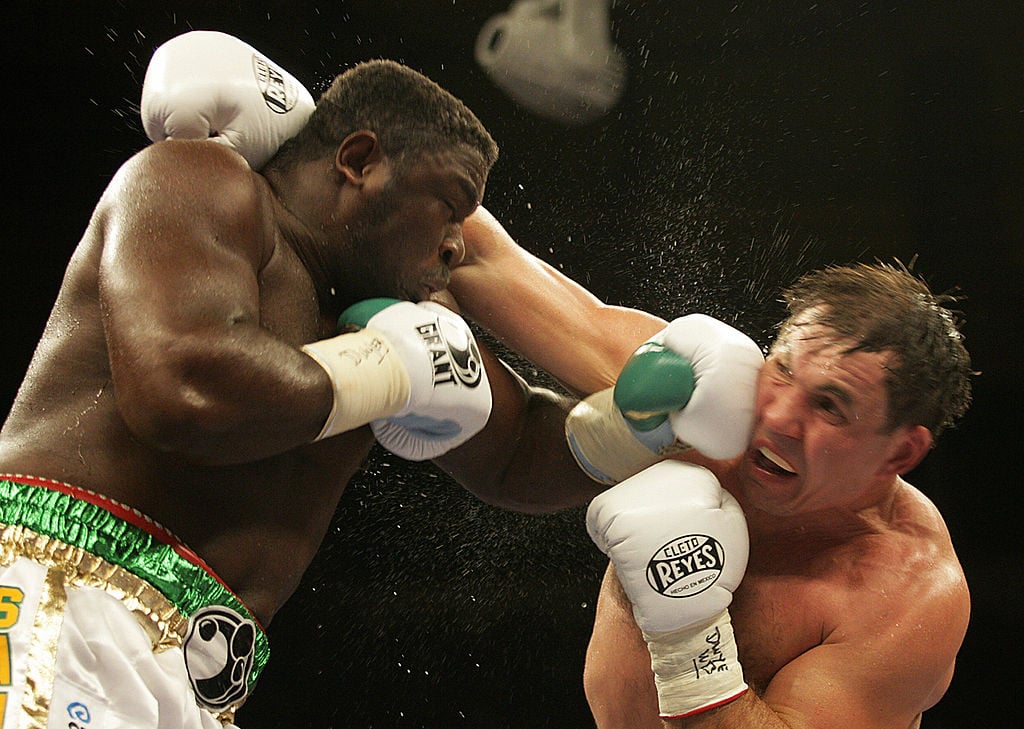
Fellow power-hitter Samuel Peter brought an end to Maskaev’s WBC title reign in Cancun, Mexico on March 8, 2008. Photo credit: LUIS ACOSTA/AFP via Getty Images
He fought on, sparingly over the next couple of years before fighting for the final time in November 2013. He retired with a record of (39-7, 28 knockouts).
Looking back the big Russian wished he had the opportunity to face Vitali Klitschko and a few others in the professional ranks.
“A lot of disappointment,” he said. “I was fighting in court to get a fight with him. We almost had that fight. Klitschko was running away from that fight. [Klitschko] told me after the court, ‘Oleg there is a lot of risk and not a lot of money.'”
Maskaev, now 54, is married, has four children and five grandchildren lives in West Sacramento, California.
“I keep training. I like to exercise every other morning. I still love boxing,” he said of his life today. “Do I have to work hard now? No. Do I have to work for my health? Yes, that’s what I do. I don’t have to work to survive.
“I’m just enjoying my life. I was able to invest my money in real estate, after my first fight with Hasim Rahman. I didn’t buy expensive cars, throw money away. I invested in real estate and sell them to make more money.”
He graciously took time to speak to The Ring about the best he fought in 10 key categories.
BEST JAB
Hasim Rahman: “He had a great jab. It was very heavy and fast. Sometimes you couldn’t see it.”
BEST DEFENSE
Sedreck Fields: “He had a good defense, it was really hard to hit him with a right hand or straight left. He was good at moving his head and body for a couple of rounds and then his stamina went out and he got tired. Danny Williams defense was good too.”
BEST HANDSPEED
Derrick Jefferson: “Jefferson he quick hands. He had great speed, especially his left hook, you have to watch out for his left-hook, it was very sharp. David Defiagbon he had great speed and was very clever in the fight. He was like a cruiserweight and had great speed.”
BEST FOOTWORK
Alex Stewart: “When I fought him, I was still a young, he was the experienced guy, it was a tough fight. He was good on his feet for his six or seven rounds until I stop him.”
SMARTEST
Sinan Samil Sam: “He was a smart guy, he put pressure on me and if I didn’t have such a great training camp I wouldn’t have won. Don’t forget he was a World amateur champion. He had great technique, was physically condition and mentally strong.”
STRONGEST
David Tua: “He was a very dangerous guy; he always followed you. You couldn’t push him back; he was very strong. His style of boxing was close to [Mike] Tyson.”
BEST PUNCHER
Tua: “I would say Tua, especially his left hook, very dangerous. The most dangerous punch is the one you do not see – fast and powerful.”
BEST CHIN
Tua: “Tua had a great chin. I think Hasim Rahman once knocked him down but they didn’t count it as a knockdown. I think Lennox Lewis fought him and he went all 12-rounds. [Lewis] didn’t hurt him. I don’t think I hurt him. [Marion] Wilson, I hit him very hard but he didn’t go down. Sinan Samil Sam was a tough guy, that guy could take a punch. I remember in the first round I hit him with a right hand and he told me in the press conference that I broke his jaw and he didn’t go down.”
BEST BOXING SKILLS
Rahman: “He was very technically good. Especially with the jab and followed up with the right hand and then left hook. He was very good when I fought him. That was his peak time.”
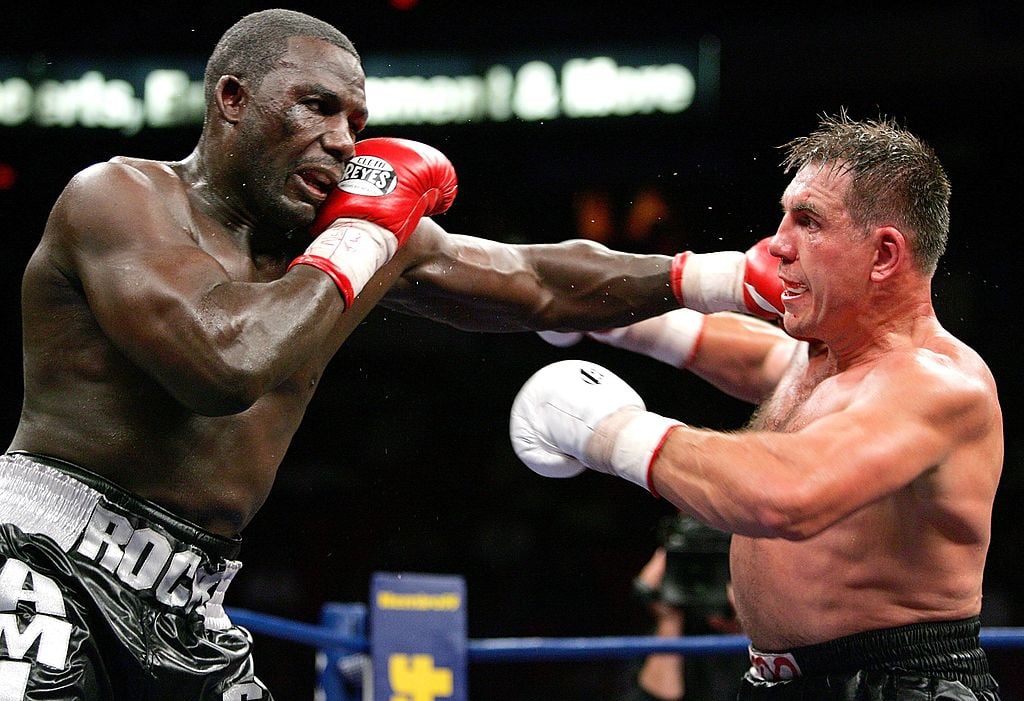
Maskaev says Hasim Rahman (pictured in an exchange during Round 10 of their WBC championship bout) was the best fighter he ever faced. Photo by Ethan Miller/Getty Images
BEST OVERALL
Rahman: “He was in great shape then. He fought me two times, I don’t know he was probably cursed against me. I’m not going to say Tua was better, I still didn’t have much experience when I fought Tua.”
Questions and/or comments can be sent to Anson at [email protected] and you can follow him on
Twitter@AnsonWainwright
SUBSCRIBE NOW (CLICK HERE - JUST $1.99 PER MONTH) TO READ THE LATEST ISSUE
